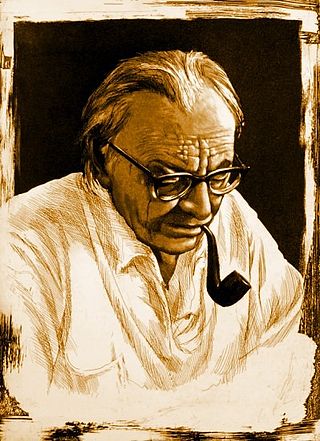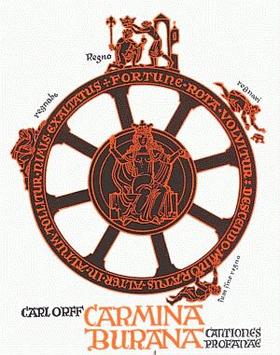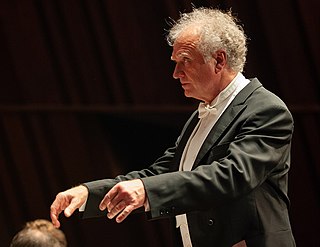Related Research Articles

Carl Heinrich Maria Orff was a German composer and music educator, best known for his cantata Carmina Burana (1937). The concepts of his Schulwerk were influential for children's music education.

Helmut Friedrich Lachenmann is a German composer of contemporary classical music. His work has been associated with "instrumental musique concrète".

De temporum fine comoedia is a choral opera-oratorio by 20th-century German composer Carl Orff. His last large work, and a personal one, it took ten years to compile the text and another two years to compose ; he revised it in 1979 and again in 1981. Orff presents a mystery play summarizing his view of the end of time sung in Ancient Greek, Latin, and a German translation by Wolfgang Schadewaldt. De temporum fine comoedia was recorded before it was premiered. Herbert von Karajan conducted sessions from 16 to 21 July 1973 in a studio in Leverkusen-Wiesdorf, employing three choruses and the Cologne Radio Symphony Orchestra. The public and stage premiere took place at the Salzburg Festival a month later, on 20 August, with the same forces and stage direction by August Everding.

Péter Eötvös is a Hungarian composer, conductor and teacher.

Carmina Burana is a cantata composed in 1935 and 1936 by Carl Orff, based on 24 poems from the medieval collection Carmina Burana. Its full Latin title is Carmina Burana: Cantiones profanae cantoribus et choris cantandae comitantibus instrumentis atque imaginibus magicis. It was first performed by the Oper Frankfurt on 8 June 1937. It is part of Trionfi, a musical triptych that also includes Catulli Carmina and Trionfo di Afrodite. The first and last sections of the piece are called "Fortuna Imperatrix Mundi" and start with "O Fortuna".
Johannes Wolfgang Zender was a German conductor and composer. He was the chief conductor of several opera houses, and his compositions, many of them vocal music, have been performed at international festivals.
Pascal Pons, born on 9 November 1968 in Nice, is a French percussionist.

The Rheingau Musik Festival (RMF) is an international summer music festival in Germany, founded in 1987. It is mostly for classical music, but includes other genres. Concerts take place at culturally important locations, such as Eberbach Abbey and Schloss Johannisberg, in the wine-growing Rheingau region between Wiesbaden and Lorch.
Adriana Hölszky is a Romanian-born German music educator, composer and pianist who has been living in Germany since 1976.
Anthony & Joseph Paratore is an internationally known classical piano duo, formed by the brothers Anthony Paratore and Joseph Paratore. The pianists have performed and recorded most of the classical repertoire for two pianos and four-hand piano, including works with orchestra and arrangements of works for orchestra. In the field of jazz they have collaborated with Dave Brubeck.
Emmanuel Séjourné is a French composer and percussionist, and head of percussion at the Conservatoire de Strasbourg. His music is influenced by Western classical music and by popular music.
Rolf Beck is a German conductor, especially a choral conductor. He was, from 1999 to 2013, Intendant of the Schleswig-Holstein Musik Festival. He founded several choirs and the Internationale Chorakademie Lübeck.
Annesley Black is a Canadian composer.
Katarzyna Mycka is a Polish marimba player and percussionist.
Margarita Höhenrieder is a German classical pianist and a professor at the Hochschule für Musik und Theater München. She has performed internationally and recorded, with a focus on chamber music. She premiered compositions which Harald Genzmer dedicated to her.

Ralf Otto is a German conductor, especially known as a choral conductor and academic teacher. He founded the Vokalensemble Frankfurt, focused on contemporary music and winning competitions including Let the Peoples Sing. Since 1986, he has been director of the Bachchor Mainz, with a tradition of performing Bach cantatas in broadcast church services. He added late romantic and contemporary works to their repertoire and made international tours with them. They made world premiere recordings of some cantatas by Bach's oldest son, Wilhelm Friedemann Bach, among other recordings. Otto was professor of choral conducting at the Folkwang Hochschule from 1990 to 2006, when he took the same position at the Hochschule für Musik Mainz.
Alois Ickstadt is a German pianist, choral conductor, university professor and composer. He was professor at the Musikhochschule Frankfurt. He promoted choral singing from children's choir to adult groups for the state broadcaster Hessischer Rundfunk, namely the Figuralchor Frankfurt which he founded in 1966 and conducted until 2011.

Oliver Korte is a German composer, music theorician, musicologist and College professor.
Christian Dierstein is a German percussionist and academic teacher. He has performed internationally as a soloist and as a regular chamber music player with ensemble recherche and Trio Accanto, performing several world premieres. He has been a professor from 2001, with a focus on music beyond Europe and improvisation.
Reinhard Wolschina is a German composer.
References
- ↑ The American Harp Journal. American Harp Society. 2001. p. 67.
- 1 2 3 4 5 6 7 "Babette Haag (Marimba, Percussion)". Bach Cantatas. Retrieved 12 May 2015.
- ↑ Mynanmar, Goethe Institute, Retrieved 30 June 2015
- 1 2 3 Lappo-Danilewski, Olga (7 June 2009). "Urgewalt des Rhythmus mit Pauken und Trommeln" (in German). Gießener Allgemeine Zeitung. Archived from the original on 10 June 2015. Retrieved 19 May 2015.
- 1 2 "Carl Orff - Carmina Burana / Béla Bartók - Sonate für 2 Klaviere und Schlagzeug / George Gershwin - Rhapsody in Blue" (in German). Bachchor Mainz. Archived from the original on 10 June 2015. Retrieved 19 May 2015.